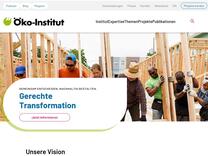How to include cooling in the EU Renewable Energy Directive? Strategies and policy implications | oeko.de https://www.oeko.de/publikation/how-to-include-cooling-in-the-eu-renewable-energy-directive-strategies-and-policy-implications/
The EU Renewable Energy Directive (RES-Directive) establishes a policy framework for the promotion of renewable energy in the EU. Under the framework of the RES-Directive, EU Member States have adopted national renewable energy action plans including sectorial targets for electricity, heating and cooling, and transport. While the RES-Directive outlines the methodology for calculating the renewable energy shares for electricity, heating and transport, it does not offer any indications on how to account for renewable cooling. Due to the lacking methodological guidelines, Member States can currently not report renewable cooling and cooling does therefore not play a role for target achievement. At the same time, the energy demand for cooling is growing rapidly and the inclusion of renewable cooling can potentially have a large impact on the renewable energy shares that Member States report. Based on an overview of available cooling technologies, this article explores various strategies for including cooling in the RES-Directive and investigates the impact on target achievement. We find that the potential impact of including cooling is considerable and conclude that ambitious minimum efficiency requirements are needed in order to maintain the ambition of the RES-Directive and to stimulate the development of policies to support low-carbon cooling technologies.
Die Arbeitshilfe beinhalt eine Einführung in die gesetzlichen Grundlagen wie KSG

